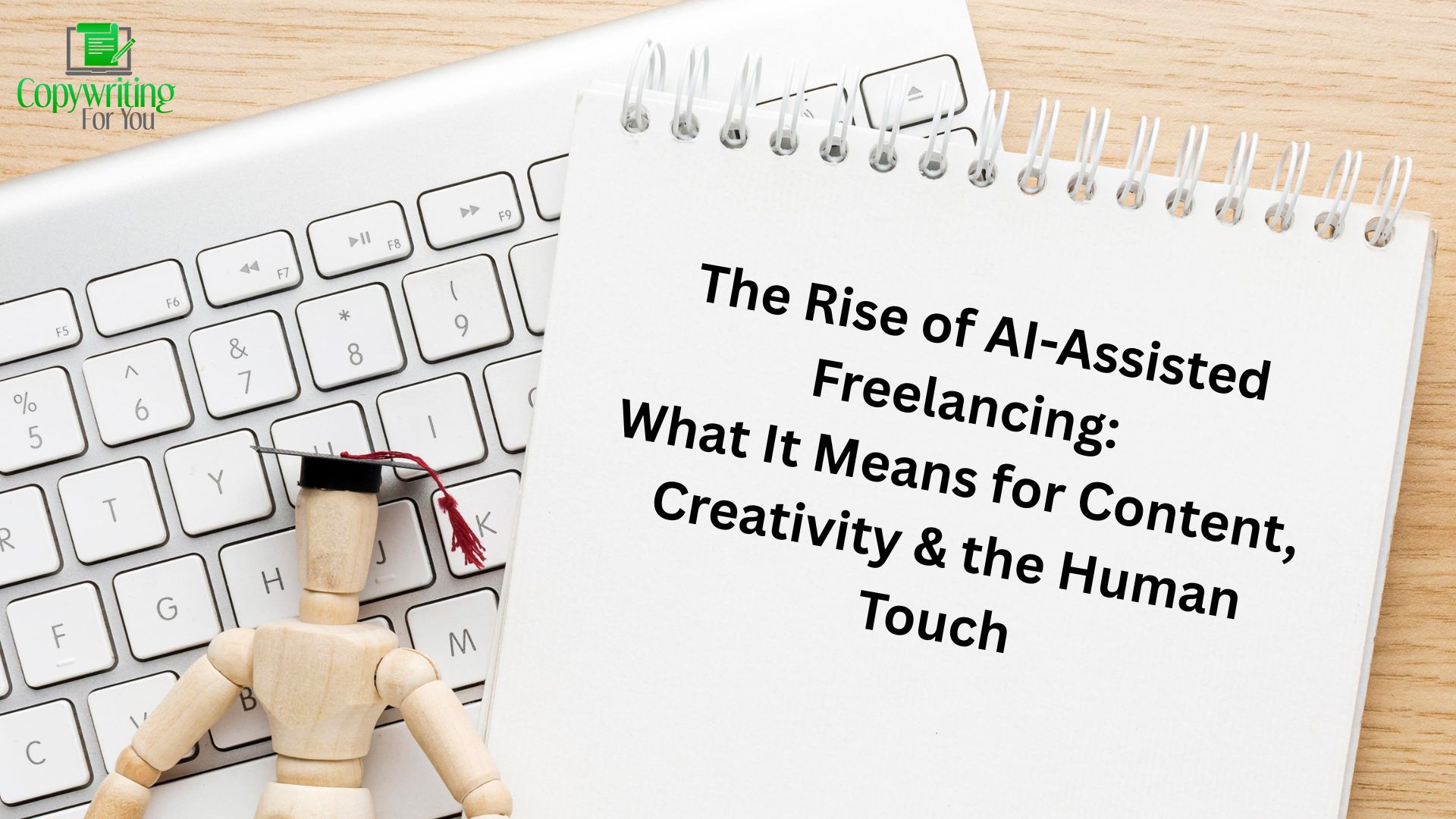The latest statistics from the Upwork Research Institute tell a story freelancers can no longer ignore: AI isn’t coming. It’s already here. And it’s shaping how independent professionals work every single day.
According to the study that showed up in my inbox today:
- 36% of freelancers now use AI for content creation
- 34% for brainstorming
- 28% for marketing and advertising
- 28% for data and reporting
- 27% for administrative tasks
The message is clear. From writing to planning to daily workflow, AI has started to weave itself into freelance life. But the real question is this: for those using AI in content creation, what does that really mean?
As a lifelong advocate of human writing, I’ll admit it took me time to embrace the idea that AI is here to stay. Yet the bigger issue isn’t whether AI exists, but how we choose to use it. Can AI make content better? Or is it simply a shortcut to write faster?
At Copywriting For You, we’ve landed firmly in the camp that AI can be a tool, not a replacement. A support system, not the star of the show. Human connection, creativity, and storytelling still matter more than ever. But in the right hands, AI can augment writing and make it stronger. And as the latest Upwork numbers show, I’m not alone in this belief.
What “Using AI for Content Creation” Really Means
The phrase “using AI for content creation” can sound scary, especially to content writers. But in practice, it doesn’t mean handing over your work to a robot. Instead, freelancers are using AI in very practical, human-directed ways:
- Drafting a starting point: Asking AI to produce a rough outline or first draft that will later be heavily revised.
- Generating variations: Creating multiple intros, headlines, or phrasing options to test which resonates best.
- Adapting tone or style: Prompting AI to reframe content in a more formal or conversational voice.
- Expanding ideas: Taking bullet points or half-formed thoughts and having AI flesh them out into fuller sections.
- Polishing and checking: Using AI to review grammar, flow, or repetitive phrasing.
In short, freelancers are using AI to move faster, explore more options, and polish more efficiently. But the heavy lifting, the judgment, the voice, the storytelling, the empathy still fall on the writer. And it has to, because AI will never be able to replace human sentiment.
Can AI Actually Make Content Better?
Let’s be honest: AI isn’t inherently creative. It doesn’t tell personal stories, draw on lived experience, or feel the emotional pulse of an audience. But in the right hands, it can help make content better.
How AI supports stronger writing
- Encourages experimentation: With AI, writers can test more directions before committing. It’s easier to see how different structures or tones might work without investing hours in rewriting.
- Improves iteration speed: Instead of editing one draft over and over, freelancers can compare multiple AI-assisted versions and blend the best parts.
- Checks clarity and consistency: AI can flag awkward phrasing, excessive repetition, or vague statements. These are things that slip by even the best writers when they’re too close to the page. This is one of the reasons I always tell people that the writer should never be the editor.
- Fills knowledge gaps: AI can suggest stats, data points, or context the writer might not have thought of. (Of course, these need to be verified.)
- Keeps momentum going: Stuck mid-paragraph? AI can nudge you forward, so you spend less time staring at the cursor and more time refining.
The limitations
Of course, there are caveats. AI often “hallucinates” facts. It really does, and I encourage you to test it out sometime to see this for yourself. AI risks producing generic or bland phrasing that sounds like every article already out there. That’s why I believe it can never replace the creative spark, personal insight, or emotional resonance that only a human brings to the page.
And that’s also why AI-assisted freelancing should be treated as an assistant, not the author. It’s a tool in the box, not the one swinging the hammer. (Yes, I did get that fun phrase from ChatGPT.)
Why the Human Touch Still Wins
Here’s where the word write really matters. Writing isn’t just putting words on a page. It’s choosing the right story, the right examples, the right tone, and connecting with readers in a way no algorithm can.
- Empathy: A machine doesn’t know what it’s like to feel doubt, joy, loss, or excitement. A writer does.
- Curatorial judgment: A human decides what matters, what to cut, and what order ideas should appear in.
- Original insight: Fresh perspectives come from experience, not prediction models.
- Brand voice: Consistency across multiple pieces of content requires memory, personality, and care.
- Trust: Readers can tell when content has a human soul behind it.
That’s why, at Copywriting For You, we continue to stand behind human writing 100%. But that doesn’t mean ignoring AI. Instead, we embrace it as part of a balanced, hybrid approach. And this is the best way we can make sure that AI doesn’t replace human writers, now or in the future.
How Freelancers Are Adapting to AI
The Upwork Research Institute didn’t just share statistics on how AI is being used. They also looked at freelancer sentiment. And the results show a workforce that is optimistic, adaptable, and ready to evolve:
- 45% are actively building new skills because of AI
- 64% believe AI will have a positive long-term impact on their freelance work
- 72% feel confident they can adapt as AI evolves
- 82% say they can learn to use new AI tools effectively
In other words, freelancers are not running from AI. They’re leaning into it, experimenting with it, and building skills to integrate it thoughtfully. Many are positioning themselves not just as writers or marketers, but as AI-augmented professionals who can work faster, smarter, and more creatively.
What This Means at Copywriting For You
For us, the answer is simple: human-first, AI-supported.
- We never hand content over to AI. Every piece remains grounded in human creativity and voice. And we implore you to avoid those writers who simply tell AI to generate an article and then copy and paste it as their own.
- We use AI where it adds value. For brainstorming, outlining, or polishing, never as a replacement for originality.
- We deliver stronger results for clients. By combining the speed of AI with the depth of human storytelling, we can create content that’s more original, more adaptable, and more competitive.
- We remain transparent. Clients can choose how much or how little AI input they want in their content. And we’ll be honest as to how we use it and when.
This hybrid approach means that while AI helps us move faster, the final result is still thoughtful, authentic, and written for real human readers.
Looking Ahead: The Future of Content Is Hybrid
Here’s my latest perspective. The future isn’t human vs. AI. It’s human plus AI.
AI helps remove roadblocks, accelerate drafts, and open creative doors. But the human writer needs to take ownership to make sure that the work resonates, connects, and inspires trust. The best freelancers won’t be those who ignore AI or those who rely on it completely. They’ll be the ones who know how to merge both.
At Copywriting For You, that’s exactly what we do. We continue to support our clients with original, human-written content. We believe it is strengthened by tools that help us write smarter, faster, and with more creativity.
Because at the end of the day, writing is still about people. And that’s something no algorithm can replace.

